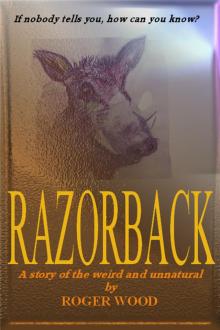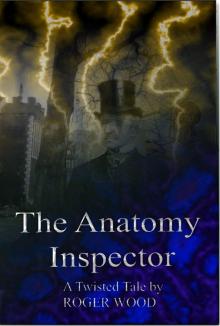- Home
- Roger Wood
Razorback
Razorback Read online
RAZORBACK
ROGER WOOD
Copyright 2015 ROGER WOOD
Contents
RAZORBACK
Also by this author: PATASOLA
About ROGER WOOD
Razorback
Halfway round the world they had travelled, from the embers of a former village on the indeterminate border of Dagestan and Chechnya to the market in Minutka Square, from Grozny to a secret distribution centre in Yemen and thence to Malualbi in southern Sudan. There the Angola-based Frenchman known only as Patrice paid a premium price which he recouped tenfold when he offered them on the internet. Yet their world, the only world they were aware of knowing, was the eight-acre smallholding midway between the Wolds and the Dales.
Although the farm was their home, they knew this was not where they came from. Their brother Stephen was nearly ten when the family moved north and Stephen never tired of reminding them that he was a Londoner, a superior status. They knew also that Stephen was not strictly their brother because Finn and Olivia were not their biological parents, although they were, apparently, Stephen’s. Quite how this situation had arisen was unclear. The Websters were a close family, could scarcely be closer, but there were things the elder Websters did not talk about, among them the details of the twins’ adoption.
Stephen took after his parents in that respect, if no other. He did not talk, for example, about his resentment of the twins or the memories he hoarded of the time before the twins came, when the Websters still lived in upmarket Islington and Stephen went to a paid-for school where he had a social circle, even friends. When the whole family had friends, whose homes they visited and who visited theirs. Parents of schoolfriends, who invited Stephen to their sons’ and daughters’ birthday parties and who, in return, brought their offspring to his. When Stephen and his mum and dad went out together, as a family, at weekends and during school holidays. When they talked, about everything and nothing. And sometimes they laughed. Stephen did not speak of his plans to return to London the moment he was old enough (whenever that might be), leaving Yorkshire, twins, parents and especially the so-called farm as far behind as it was possible to get. Above all, Stephen did not discuss his dreams. He would have liked to confide in someone, because his dreams disturbed him even during the day, but the twins were too young and somehow alien and his parents were out of the question. High on the list of things Olivia and Finn would never hear about were the disturbing subjects of their son’s dreams: meat and sex.
Stephen could remember a time, before the twins, when he and his father ate meat four or five times a week. He remembered beef and pork and chicken. He remembered not liking lamb. His father, Finn, did not like turkey. They both adored bacon, grilled to a crisp and slathered in brown sauce. Stephen remembered the sensation of beef juice in his mouth, shards of bacon rind between his teeth. He vaguely remembered finding out in kindergarten that meat came from moo-cows, piggies and chick-chicks and excitedly sharing the news with his mother when she came to collect him. He remembered – probably his earliest memory – her revulsion. Don’t – just the thought of it makes me – ugh! And that was the end of meat in the Webster family. No discussion, certainly no protest from Stephen’s father. Animal products simply vanished from their diet. But not from Stephen’s dreams.
For a long time Stephen had not understood why he dreamt of meat. It was not as if he went to bed hungry or particularly missed the taste. It was only later, when his dreams became more complex and much more disturbing, that he realised. He dreamt of meat because it was preferable to dreaming about ... the other stuff.
The other stuff – that was the only way, for two or three years, that Stephen was able to classify the nightmares of flesh on flesh, probing dark fleshy places, flesh that was at the same time soft and hard, flesh that throbbed and pulsed beneath the skin. It was pure fluke that Stephen stumbled upon the word sex when he was fifteen. He still did not know the proper term for what happened sometimes at the end of his sex dreams. That, in Stephen’s strictly private vocabulary, remained sticky wee.
The first time it had happened, rather than risk his mother finding out, Stephen had washed his own sheets. I’m old enough to help out – and you’ve the twins to look after. Olivia did not argue – it was, after all, a statement of fact – and Finn, inevitably, said nothing. Soon washing became Stephen’s chore and after a while it led to other chores, like turning the compost heap where all the vegetables the Websters could not eat ended up. That in turn led to Stephen helping his father plant and dig the vegetables, but only within sight of the house. Stephen was not allowed to stray where others might see him. Because they would ask questions.
The ever-inquisitive they was a concept Stephen often wrestled with. Who they might be and why they should concern themselves with the unobtrusive Websters was a mystery to him. He asked his father once, but distant, dreamy Finn, drained, it seemed, of everything that suggested an autonomous existence, only sighed and told him to ask his mother. Like that was ever going to happen. There had been conversations once, of a sort, between Stephen and Olivia. Back in London, before the twins. Back then, he recalled, his mother always seemed to be busy. Although she did not work, she was always out and about, socialising, volunteering, doing good works. He could not remember his mother eating with her husband and son. In fact, he had only fragmentary memories of his mother eating anything in London. A bowl of cereal, a tub of yoghurt, soup spooned straight from the pan. He remembered her, then, as a glamorous figure. He remembered long legs, sheer tights, short skirts, high heels. He remembered cascades of bright reddish-brown hair. Now, in Yorkshire, he couldn’t say for sure that Olivia still had hair, it was so long since he had seen her without an all-enveloping headscarf. It went without saying she still had legs but slender, bandy, bowed or even hairy, Stephen had no way of knowing. In Yorkshire Olivia Webster wore a working man’s overalls, navy-blue, several sizes too big. Finn and Stephen wore versions of the same, Stephen’s now patched and let out to accommodate growth, Finn’s increasingly tent-like as he incrementally lost substance. Soon father and son would be able to swap, a prospect, seemingly, of no consequence to either.
Sure enough there came a day when Stephen was rising sixteen and his father did not appear for breakfast. Stephen was amazed to find his mother at the scullery table, headscarf tightly knotted, eyebrows daubed black. Automatically, Stephen sought the twins. The idea of Olivia without Amelia and Richard clinging to her seemed absurd. And yet---
---Your father’s not feeling well.
---Oh.
---The twins want blackberries.
---Do they?
---You’ll have to fetch them, Stephen. Your father’s not---
It was the longest conversation Olivia and Stephen had shared in years. Stephen did not try to extend it. He was in his donkey jacket and out the door before Olivia had chance to change her mind.
The most important conversation of Stephen’s life – the conversation that changed and ruined everything – happened when he was eight years old. He came home from school one afternoon in May or early June, dropped off by his friend Callum’s mum, to find his own mother waiting for him, which was odd, because she was never home before five or six. But there she was, sat on the stairs, her knees clutched to her chest, wearing an outsize grey woollen cardigan Stephen had never seen before. He was aware of his father, also unexpectedly home, loitering in the shadows of the passage that led to the kitchen. We’ve something to tell you, Stephen, she said. It’s a surprise.
It certainly was: two ugly red-faced infants in a sort of double carry-cot. They were not newborns. Stephen knew because he had seen the baby brothers and sisters of his playmates at school. These infants were large, perhaps twic
e the size of the babies he had seen. They had hair, one fair, the other brownish black. Babies, in Stephen’s experience, either squalled or slobbered or pooped. Not these. These slept curled around one another, entwined, blissful smiles on their chubby faces. The one on the right, his mother said, the blonde one, was a girl called Amelia. The other, smaller but somehow more muscular, was a boy. A baby brother for you, Stephen. We’re thinking of calling him Richard. It was as good a name as any, Stephen thought. He wanted to say, He’s not my brother.

 Razorback
Razorback The Anatomy Inspector
The Anatomy Inspector